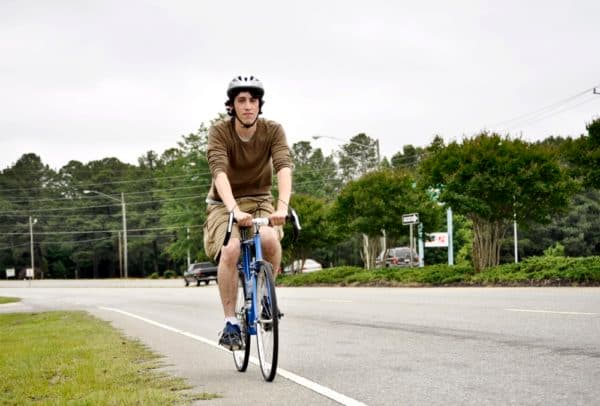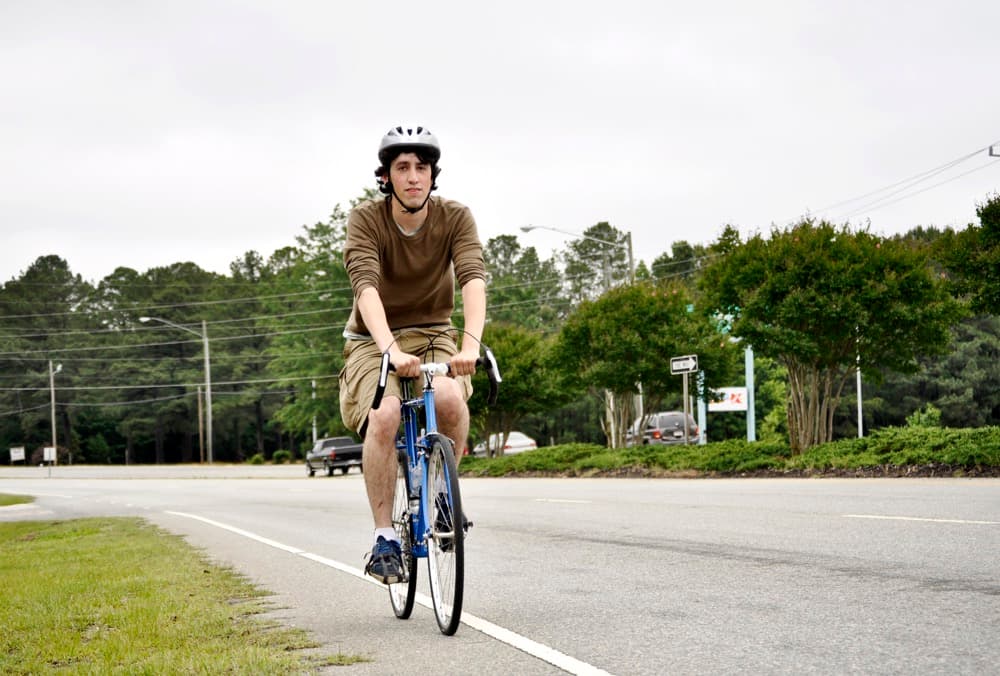I used to work in a little town called Smithfield, N.C. It's best known for its yams, its hams and, unfortunately, a huge sign that declared its support for the KKK well into the 1970s.
This is the story of how riding my bike to work there briefly made me newspaper famous.
It was six years ago this month. There weren't a lot of us at The Herald, and summer was naturally slow for news, because it gets too damn hot to cause much trouble. In short, we had pages to fill, and my editor had an idea: Bike to work for Bike To Work Week.
In retrospect, I'm not sure if it's really legal to ride the shoulder of U.S. 70 Business for the better part of 12 miles, but that's what I did.

As I wrote:
Somehow or another, I was going uphill when I passed the 10-miles-to-Smithfield sign, and still uphill when I passed the tobacco fields at the edge of town, and uphill as tractor-trailers rattled my bike and my wits.
I had never noticed all those hills as I blasted home in my 2006 Ford Focus, or realized how remote a four-lane highway can feel. It was almost silent as I crossed the bridge over U.S. 70, between Smithfield and Clayton. Throughout the journey, I glimpsed details that escaped me during my drives, like a tiny abandoned cabin tucked into the treeline.
It took me maybe an hour, because I'm not real fast, and because my dad built my steel-frame Univega partially from scrap. I got weird looks, I'm sure, but no honks.
The damnedest thing happened when the story went to press: People cared.
I mean, not a lot, but enough. A dude recognized me in a parking lot in Meadow, N.C., (just as sleepy as it sounds) as "the guy that rode his bike to work." That may have been the high-water mark of my fame, but I definitely felt like the topic of discussion for a couple days.
The point is not that this was a great article, although, OK, I am stuck in a humblebrag right now. I'm also not trying to portray Smithfield as some backward place — biking to work was rare there because bike infrastructure is expensive and rural economies have been pounded over the last decade.
The point is that biking to work in Johnston County, just barely outside Raleigh, was so unusual as to be interesting. You might not guess it living in Denver, but biking to work is very much a novelty in most of the U.S.
The experience, along with the magnificent sorrow of getting dumped, really started me biking. I'd ride for hours that summer, learning a new road each evening, rarely seeing anyone else with pedals.
It made me learn the place. No GPS, no windows in the way. As I wrote: "In a car, a road is just a road, but on a bike, the world becomes a place to explore again."
I showed up here a year ago, still riding my Univega.
I mean, I drove here, but the Univega's still my bike.
As usual, pedaling was how I explored. But this time was different. In Raleigh and the rest of the places I've lived, it would take me months to piece together routes, usually by combining patchwork greenway trails with the least-dangerous roads. North Carolina was still building the backbone of its bike networks while I lived there. Even its biggest cities are decades behind Denver.
Let me put it this way: On one of my first rides here, I ended up at Red Rocks, and I barely touched the road. I'm not a hardcore cyclist, but the continuity of the paths pretty much dared me to keep going.
I'd discover in the next few months that it's actually faster to get places on bike — even to bars on the other side of town, or even to work.
Biking is unusually usual in Denver.
Denver ranks ninth in the U.S. for bicycle commuting, according to the League of American Bicyclists' 2014 analysis of American Community Survey data.
I'd also argue that the extensive and interconnected trails have opened the possibility up to an economically diverse set of neighborhoods beyond the downtown hub, where transit services typically are clustered, with millions more dollars of work on deck.
Still, reasonable people can argue about whether bike infrastructure is worth the investment. There are obvious health and environmental benefits, yet adoption remains narrow here with an estimated 2.5 percent of people commuting by bike.
But today, at least, it looks downright typical.
It's Bike To Work Day, and in Denver that means hordes of cyclists on the paths and roads.
Is it a vision of what's to come? Maybe.
At the very least, it'd surprise the hell out of Smithfield.













